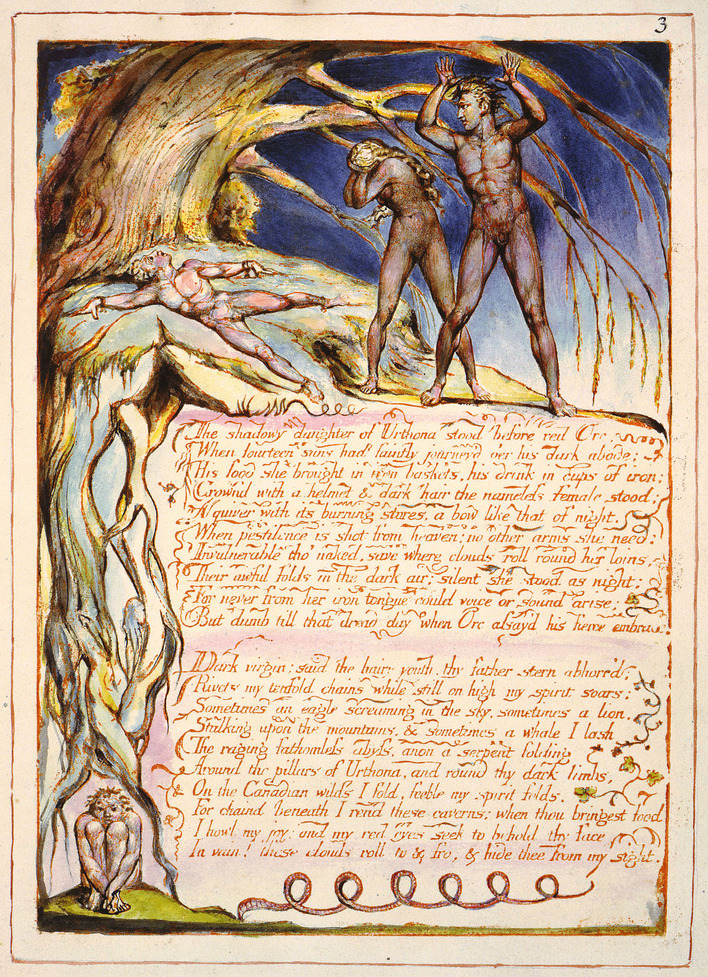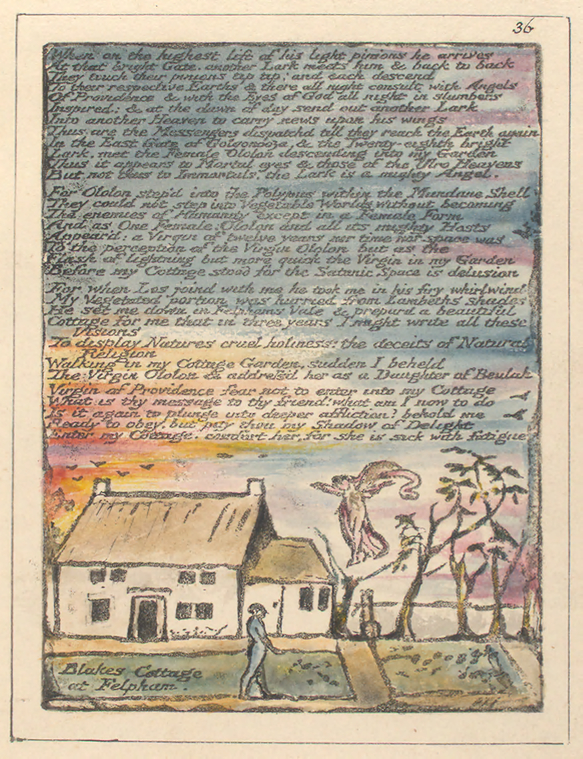Wikipedia Commons
America
Plate 10
When
we attempt to understand how our own psyches are structured we realize
that our reasoning power developed upon a pre-existing capability of
which the reason has no knowledge. The 'form' on which the subsequent
development built is called by Jung 'archetypes'. For the psyche to
reach its maximum state the individual has the task of recognizing what
is hidden from his conscious mind in the archetypes.
Jung
postulates that the form of the archetypes are inborn. The brain of
each individual is organized in such a way that awareness of similar
archetypes is common to us all. As the mind becomes aware of the
patterns which are innate they become filled with content from the
experience of the individual.
Four Archetypes, CG Jung
Page 1
"There
is an a priori factor in all human activities, namely the inborn,
preconscious and unconscious individual structure of the psyche."
Page 12
...
"There are present in every psyche forms which are unconscious but
nevertheless active-living dispositions, ideas in the Platonic sense,
that perform and and continually influence our thoughts and feelings and
actions...archetypes are not determined as regards their content, but
only as regards their form and then only to a very limited degree."
Page 18
"Our
task is not, therefore, to deny the archetype, but to dissolve the
projections, in order to restore their contents to the individual who
has involuntarily lost them by projecting them outside himself."
Like
Jung, Blake knew that the reasoning power was incomplete. There are
abilities which are outside of the purview of reasoning, sensation, and
consciousness. Blake states that man "percieves more than sense (tho' ever so acute) can discover".
THERE is NO NATURAL RELIGION, [a], (E 2)
"The Argument Man has no notion of moral fitness but from
Education. Naturally he is only a natural organ subject to
Sense.
I Man cannot naturally Percieve, but through his natural or
bodily organs
II Man by his reasoning power. can only compare & judge of
what he has already perciev'd.
III From a perception of only 3 senses or 3 elements none
could deduce a fourth or fifth
IV None could have other than natural or organic thoughts if
he had none but organic perceptions
V Mans desires are limited by his perceptions. none can desire
what he has not perciev'd
VI The desires & perceptions of man untaught by any thing but
organs of sense, must be limited to objects of sense."
THERE is NO NATURAL RELIGION, [b], (E 2)
"I Mans perceptions are not bounded by organs of perception. he
percieves more than sense (tho' ever so acute) can discover.
II Reason or the ratio of all we have already known. is not
the same that it shall be when we know more.
[III lacking]
IV The bounded is loathed by its possessor. The same dull
round even of a univer[s]e would soon become a mill with
complicated wheels.
V If the many become the same as the few, when possess'd,
More! More! is the cry of a mistaken soul, less than All cannot
satisfy Man.
VI If any could desire what he is incapable of possessing,
despair must be his eternal lot.
VII The desire of Man being Infinite the possession is Infinite
& himself Infinite
Conclusion, If it were not for the Poetic or Prophetic
character. the Philosophic & Experimental would soon be at the
ratio of all things & stand still, unable to do other than repeat
the same dull round over again
Application. He who sees the Infinite in all things sees
God. He who sees the Ratio only sees himself only.
Therefore God becomes as we are, that we may be as he is" Blake's awareness of the structure of the mind was his recognition of the permanence of mental realities which were not limited by temporal/spacial considerations.
Although
Blake used the word 'archetype' only once, he used the word permanent
numerous times with reference to the mental world which we inhabit:
America, Plate 10, (E 55)
"Thus wept the Angel voice & as he wept the terrible blasts
Of trumpets, blew a loud alarm across the Atlantic deep.
No trumpets answer; no reply of clarions or of fifes,
Silent the Colonies remain and refuse the loud alarm.
On those vast shady hills between America & Albions shore;
Now barr'd out by the Atlantic sea: call'd Atlantean hills:
Because from their bright summits you may pass to the Golden world
An ancient palace, archetype of mighty Emperies,
Rears its immortal pinnacles, built in the forest of God
By Ariston the king of beauty for his stolen bride,
Here on their magic seats the thirteen Angels sat perturb'd
For clouds from the Atlantic hover o'er the solemn roof."
Milton, Plate 22[24], (E 117)
"I in Six Thousand Years walk up and down: for not one Moment
Of Time is lost, nor one Event of Space unpermanent
But all remain: every fabric of Six Thousand Years
Remains permanent: tho' on the Earth where Satan
Fell, and was cut off all things vanish & are seen no more
They vanish not from me & mine, we guard them first & last
The generations of men run on in the tide of Time
But leave their destind lineaments permanent for ever & ever."
Jerusalem, Plate 13, (E 157)
"A Concave Earth wondrous, Chasmal, Abyssal, Incoherent!
Forming the Mundane Shell: above; beneath: on all sides surrounding
Golgonooza: Los walks round the walls night and day.
He views the City of Golgonooza, & its smaller Cities:
The Looms & Mills & Prisons & Work-houses of Og & Anak:
The Amalekite: the Canaanite: the Moabite: the Egyptian:
And all that has existed in the space of six thousand years:
Permanent, & not lost not lost nor vanishd, & every little act,
Word, work, & wish, that has existed, all remaining still"
Four Zoas, Night Night VII, Page 98, (E 370)
"And first he drew a line upon the walls of shining heaven
And Enitharmon tincturd it with beams of blushing love
It remaind permanent a lovely form inspird divinely human
Dividing into just proportions Los unwearied labourd
The immortal lines upon the heavens till with sighs of love
Sweet Enitharmon mild Entrancd breathd forth upon the wind
The spectrous dead Weeping the Spectres viewd the immortal works
Of Los Assimilating to those forms Embodied & Lovely
In youth & beauty in the arms of Enitharmon mild reposing"
Four Zoas, Night VIII, Page 113, (E384)
"The furrowd field replies to the grave I hear her reply to me
Behold the time approaches fast that thou shalt be as a thing
Forgotten when one speaks of thee he will not be believd
When the man gently fades away in his immortality
When the mortal disappears in improved knowledge cast away
The former things so shall the Mortal gently fade away
And so become invisible to those who still remain
Listen I will tell thee what is done in the caverns of the grave
Vision of Last Judgment, Page 70, (E 555)
"The Nature of Visionary Fancy or Imagination is very little
Known & the Eternal nature & permanence of its ever Existent
Images is considerd as less permanent than the things of
Vegetative & Generative Nature yet the Oak dies as well as the
Lettuce but Its Eternal Image & Individuality never dies."
Vision of Last Judgment, Page 71, (E 555)
"There Exist
in that Eternal World the Permanent Realities of Every Thing
which we see are reflected in this Vegetable Glass of Nature"







